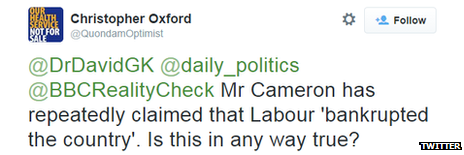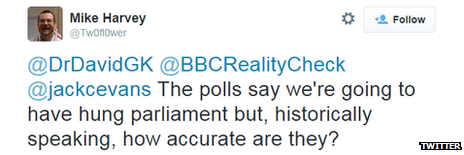Goodbye from BBC Reality Check
- Published
- comments
We hope you have found our BBC Reality Check service useful over the course of the campaign, and before we go, here are some final questions you have sent in via social media.
Did Labour bankrupt the country?
Christopher Oxford tweeted, external: "Mr Cameron has repeatedly claimed that Labour 'bankrupted the country'. Is this in any way true?"

Well, the first problem with this question is what do the Conservatives mean by this allegation?
Unlike with individuals, there is no clear definition of when a country might be declared bankrupt.
The standard definition of being bankrupt is when you cannot pay your debts.
The UK never defaulted on its debts so, by that definition, the country was never bankrupt.
On the other hand, under Labour public sector net debt rose significantly (for a variety of reasons) and it is certainly arguable the economy as a whole was in a very precarious situation.
But, technically at least, not bankrupt.
How accurate are the polls anyway?
Mike Harvey tweeted, external: "The polls say we're going to have a hung parliament but, historically speaking, how accurate are they?"

Well, we do like a poll here at BBC Reality Check - but should we put so much faith in them?
How have they performed in the past when it comes to predicting the results of previous elections?
There are certainly more polls during the course of the campaign these days, but traditionally it is the last poll from each company before the actual vote that is used to judge their performance.
Aside from 1992, Major v Kinnock, all the major companies have called the correct party share of the vote in the last few elections.
Interestingly, while pollsters seem to do well at predicting the Conservative and Liberal Democrat share of the vote they do tend to overestimate the share of the vote Labour will get.
Except in 2010, when it was understated.
This slight fuzziness around predictions for Labour could mean this election has some surprises in store.
One final note - this is all about correctly predicting the share of the vote.
That then has to be transferred into actual seats and that adds another layer of complexity and confusion.
So the polls are usually pretty accurate, but, as the cliché goes, there is really only one poll that matters.
Does the weather affect election turnout?
Martin McElroy tweeted, external: "Does weather affect turnout and which party does it benefit?"

This question has lead me to my favourite scientific paper ever, external: "The rain in Spain: Turnout and partisan voting in Spanish elections"
The conclusions are remarkably similar to what American research into this issue has discovered.
According to the Spanish paper, "rainfall on election day decreases turnout... second stage results show that conservatives are greatly hurt by higher turnout".
Academics at Stanford, external came to broadly the same conclusion.
But they also go on to point out that while politicians can't control the weather, they can try and control voter turnout: "Democrats should act to increase voter turnout while Republicans should act to suppress turnout."
Seasoned watchers of the American political system might argue both sides employ various ways to try and do just that.
Finally, that Spanish paper notes there was one major difference to the experience of the American two party system.
In Spain, as the turnout went up it seemed to benefit a raft of smaller parties rather than the main left-wing opposition.
So where does that leave us?
Well, according to Stephen Fisher from Oxford University, the weather does not seem to have an impact on our elections.
But it does give you something to talk about when you visit the polling station.